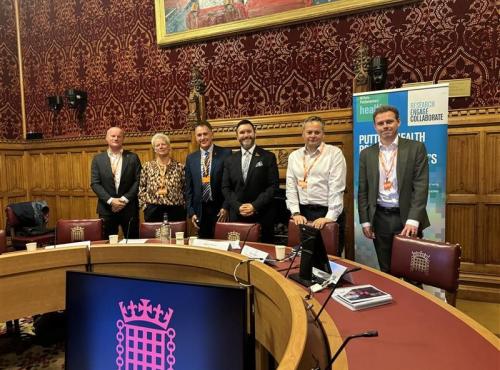How we fare in the manifestos – policy highlights so far
The last few weeks have seen promises and pledges from all major parties in their manifestos. The NHS, climate action and Brexit are all front of centre of this year’s election, however, in this post, we wanted to highlight some of the Policy Connect recommendations from our reports that have been mentioned in manifestos.
A key highlight from the manifestos has been from our Plastic Packaging Plan, which called for an end to plastic waste exports by 2030. The report and follow on engagement work with policy makers has spanned across two years and so we delighted to see cross-party support for this recommendation from the Conservatives, Liberal Democrats, Labour, SNP and Green party.
After the election, we will be engaging MPs, Ministers and civil servants alongside our partners from industry, academia and the third sector to take the commitment into deliverable policy.
The Green Party has also pledged to prioritise flooding recovery, taking on our recommendation from our Bricks and Water report, which urges the government to introduce a fairer, tougher and simpler planning framework supported building regulations, by pledging to introduce a change to the planning system to prevent building on floodplains, to further reduce the flooding risk communities’ face.
From an education & skills perspective, at Policy Connect we were pleased to see the adoption of a Skills Commission recommendation for an Apprenticeship Premium in the shape of the Liberal Democrat‘s Social Mobility Fund’. While the implications of using 25% of levy funds to support this will have to be carefully considered given the current levy overspend, this represents a positive step to bring the inclusion agenda to apprenticeships and overcome some of the challenges around access to apprenticeships we documented in our Apprenticeships and Social Mobility report.
One of the key pledges within health from the parties has been around medical research and development with the Conservative Party committing to doubling R&D spending to £18 billion. However, while we would have hoped to see carbon monoxide as a priority across parties, given the impact CO poisoning has on the brain, as outlined in our report Carbon monoxide poisoning: saving lives, advancing treatment we will continue our work in this field and across health with the new government.
From a technology perspective, parties have started to recognise the importance of specific data and digital policies. There is an acknowledgement by most major parties that data-driven technologies will be essential in facing the challenges and meeting the opportunities facing the country with the Conservatives pledging to increase their spend in in cloud computing and data and Labour intending to introduce the Charter of Digital Rights. Politicians from across the political divide have made much of the so-called Fourth Industrial Revolution and the central role that data-driven technologies will have in bringing about the next step-change in industrial policy.
In Trust, Transparency, Tech, a landmark report launched in May 2019 by the All-Party Parliamentary Group on Data Analytics (APGDA), the Group made a number of key recommendations for how data-driven technologies could be developed in an ethical fashion. The Liberal Democrats have referred to a number of the points raised in the report, including recognising the role to be played by the new Centre for Data Ethics and Innovation to provide guidance around the use of data in responsible ways. It also calls for the establishment of a citizens’ assembly to determine when it is appropriate for government to use algorithms in decision-making. Both of these represent key points made by the APGDA in informing the debate about this vital area.
The manifesto launches have raised many interesting questions around what the next government should be prioritising, whether it be climate change, the NHS, or Brexit. From our perspective, while we are pleased to see many of our recommendations included in manifestos, there is still more that can be done to bring forward big issues that the country continues to face, and we look forward to the new government tackling those in due course.



